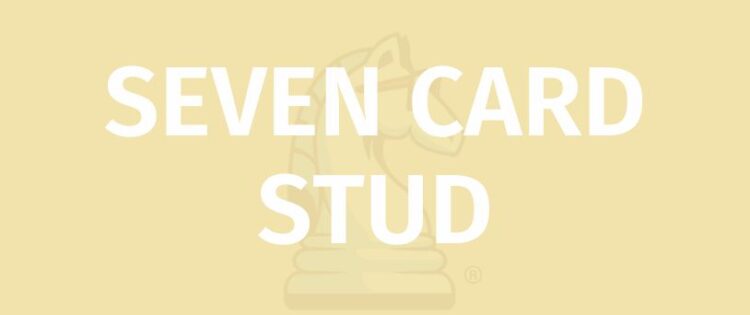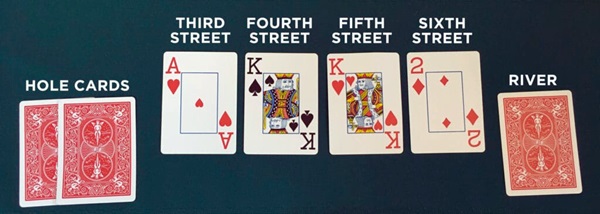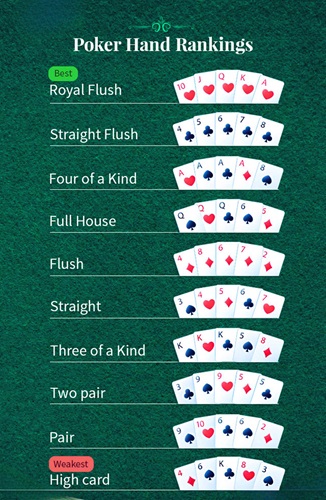
OBJECTIVE OF SEVEN CARD STUD: The game’s objective is to have the best hand and win the pot.
NUMBER OF PLAYERS: 5-7 players
NUMBER OF CARDS: standard 52-card
RANK OF CARDS: A, K, Q, J, 10, 9, 8, 7, 6, 5, 4, 3, 2
TYPE OF GAME: Casino
AUDIENCE: Adults
OVERVIEW OF SEVEN CARD STUD RULES
The people to first play Stud poker games were during the American Civil War! This popular poker game became popular in New Orleans and Mississippi, as tourists believed it was a game of luck and not skill! Seven Card Stud is a popular bidding game for casinos and home play. Below, we will review the rules for Seven Card Stud and some game variations.
HOW TO DEAL IN SEVEN CARD STUD

Before the first official betting round, the dealer gives each player two face-down cards (hole cards) and one face-up, called the third street. The player with the lowest face-up card pays the bring-in bet. Suit rankings break ties for the low card. Suit rank follows backwards alphabetical order. For those who are confused, Clubs, Diamonds, Hearts, and Spades are the ranking of suits.
If there is a bring-in bet, the first player betting in the official round may not check. Betting begins with the player who has the highest card. If there was no bring-in, this player may check (not place a bet). If players tie for a high card, the first player immediately clockwise to the dealer begins the betting.
HOW TO PLAY SEVEN CARD STUD
The rules and mechanism of play in Seven Card Stud is very similar to Five Card Stud’s. This article assumes you are familiar with certain poker semantics. If you are new to poker, check out Poker Basics to familiarize yourself with the jargon and general structure of poker games.
BETTING ACTIONS
During betting rounds, you will have the opportunity to call, raise, check, or fold. The circumstances when players may check or not place a bet are outlined in the instructions above and vary from game to game. In a betting round, calling, raising, and folding are the most common actions:
- Call. You may call by betting the amount wagered by a previous player. For example, if you bet 5 cents and another player raises the bet amount to a dime (raises 5 cents), you may call on your turn by paying the pot 5 cents, thus matching the 10-cent bet amount.
- Raise. You may raise by betting the amount equal to the current wager and then bet more. This increases the wager or bet amount on the hand, which other players must match if they wish to remain in the game.
- Fold. You may fold by laying down your cards and not betting. You do not have to put money in the pot, but you do sit out on that hand. You forfeit any money wagered and have no opportunity to win the pot.
- Ante. An ante is a set amount you must pay to play in the hand of Seven Card Stud. Sometimes, home games omit this rule.
FIRST ROUND
After the initial betting round, players are dealt another face-up card, called the fourth street, after the burn card. For anyone who does not know, a burn card is a card on the top of the deck that the dealer discards; the players do not use it. The dealer passes out cards starting from their left—the player whose two face-up cards (or up cards) begins the second round of betting. Since there are fewer than five up cards, players are still waiting to make straights, flushes, or full houses, but you can still guess what value your hand may have!
SECOND ROUND
Once the dealer deals all the cards, the players bet again, starting with the player with the highest hand. This stipulation for the first bet remains consistent throughout the game; all that means is that the bet amount remains the same and only increases each betting round- the first player to bet always has the highest hand. Betting passes clockwise afterward.
At the end of the second round of betting, the dealer deals another up card called the fifth street, followed by another round of betting.
THIRD ROUND
After the third round of betting the dealer deals a fourth card, called Sixth Street. Following this is, you guessed it, a fourth betting round!
FOURTH ROUND
After the fourth betting round, the fifth card, the river, is distributed face-down! This leaves a bit of mystery going into the final betting round.
FIFTH ROUND
After is the fifth betting round, and there will then be a showdown if more than one player remains. If you are the only player left by now, congratulations on winning the hand!
You can simplify the Seven Card Stud deal as “two down, four up, one down,” which refers to the quantity and order of how the dealer deals the cards.
EIGHT-PLAYER SEVEN CARD STUD
Want to play with just one more person? In games with eight players, including the burn cards, seven card studs use 60 cards in gameplay. This is often not an issue, even though decks are only 52 cards because many players fold before the end of the hand. However, if the deck runs dry during gameplay, the dealer may use the burn cards if they fulfill the needed number.
If they do not, instead of players receiving a down card in the final round, a single community card is dealt to the table. All players share this card. Cards that were discarded from folded hands may not be used. Otherwise, the game follows the setup above for deal and play. Enjoy!
SHOWDOWN
Get ready for the big show! From the seven cards collected through gameplay, players who remain will try to make the best hand out of the five cards they possibly can at showdown. The player with the highest ranking hand (Poker Hand Rankings) wins the pot; if there is a tie, the tied players split the pot.
SEVEN CARD STUD HAND RANKINGS

The hand rankings for Seven Card Stud are the same as most poker games.
- The highest-ranked hand one can make is a Royal Flush. This requires you to have Ace through 10 of the same suit.
- The next highest is the Straight Flush, which is any five cards in ranking order of the same suit.
- Following up next is a four-of-a-kind. This means your hand will have four cards of the same rank.
- The next rank of hand is the full house. You will need three of a kind and a pair of cards to achieve this.
- Flush is the next-hand rank, requiring you to have five cards in the same suit.
- A straight is a hand of cards in ranking order but not of the same suit.
- Following this, a three-of-a-kind is the next highest ranked. You will need three cards of the same rank for this hand.
- Getting into the low-ranking hands is two pairs. This requires you to have two sets of two cards of the same rank.
- Then, there is the single pair. You only need two cards of the same suit for this hand.
- Finally, the High Card is the lowest ranking hand as it is just the highest ranked card in your hand.
VARIATIONS
SEVEN CARD STUD HI/LO
At the showdown, players choose five cards to make the highest or lowest hand they can. The pot is split evenly between players with the highest and lowest-ranking hands. If the pot is uneven, the player with the high hand gets the odd chip.
In Hi/Lo Eight or Better, sometimes abbreviated to Seven Stud/8, players must have an eight or lower to have a low hand.
Another fun poker variation like this is called Low Hole.
MISSISSIPPI STUD
This common variant removes the betting round between fourth and fifth streets (fourth and fifth rounds), so there are only four betting rounds. The fifth and final card is dealt face up. These variations make the game resemble Texas Hold ‘Em.
LONDON LOWBALL
A version of seven card stud, played low hand only, using ace-to-six rankings.
There is typically a limit on the pot.
RAZZ
This is a variation of Seven Card Stud, played low hand only, using ace-to-five rankings. The player who holds a high card makes the bring-in bet; this is before the first round of betting. From Fourth Street on, the betting begins with the player who holds the lowest hand. Ace is always low, and King is always high. The suit of the high card breaks ties for equivalent hands. For example, if one player has 7 Hearts & 2 hearts and the other has 7 clubs & 2 diamonds, the player with 7 clubs starts the betting because clubs are lower than spades. Reminder: Suits rank in reverse alphabetical order, with spades being the highest-ranking suits and clubs the lowest.
If playing Razz fixed limit, on Fifth Street, the limit doubles, and big bets are only allowed from then on. Third and fourth streets only permit small bets.
The traditional Seven Card Stud rules, as well as Razz, and Eight or Better are all used in the game Horse Poker!
- 12 BEST HARRY POTTER BOARD GAMES - November 16, 2023
- 50 BEST HALLOWEEN GAMES - October 4, 2023
- 50 BEST CHRISTMAS GAMES - September 13, 2023